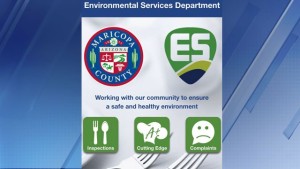In the spring of 2018, an E. coli O157 outbreak linked to romaine lettuce grown in the Yuma, Arizona area resulted in 210 reported illnesses from 36 states, 96 hospitalizations, 27 cases of hemolytic uremic syndrome (HUS) and five deaths.
 The U.S. Food and Drug Administration has launched a new initiative with support from the Arizona Department of Agriculture, and in conjunction with the University of Arizona Cooperative Extension, the Wellton-Mohawk Irrigation and Drainage District (WMIDD), and members of the Yuma area leafy greens industry to better understand the ecology of human pathogens in the environment in the Yuma agricultural region. This initiative will be a multi-year study which will focus on how these pathogens survive, move and possibly contaminate produce prior to harvest.
The U.S. Food and Drug Administration has launched a new initiative with support from the Arizona Department of Agriculture, and in conjunction with the University of Arizona Cooperative Extension, the Wellton-Mohawk Irrigation and Drainage District (WMIDD), and members of the Yuma area leafy greens industry to better understand the ecology of human pathogens in the environment in the Yuma agricultural region. This initiative will be a multi-year study which will focus on how these pathogens survive, move and possibly contaminate produce prior to harvest.
While the FDA, the Arizona Department of Agriculture and other state partners conducted an environmental assessment from June through August 2018 that narrowed the scope of the outbreak, the specific origin, the environmental distribution and the potential reservoirs of the outbreak strain remain unknown.
Between 2009 and 2017, FDA and partners at CDC identified 28 foodborne STEC outbreaks with known or suspected links to leafy greens. Like a lot of fresh produce, leafy greens are often eaten raw without a kill-step, such as cooking, that could eliminate pathogens that may be present.
Sounds like Yuma growers could use a Box of Rain. Or maybe more knowledge of the microbial ripple effect. May death be groovy for you, long-time Grateful Dead collaborator and lyricist Robert Hunter, who passed on Tuesday, aged 78.









